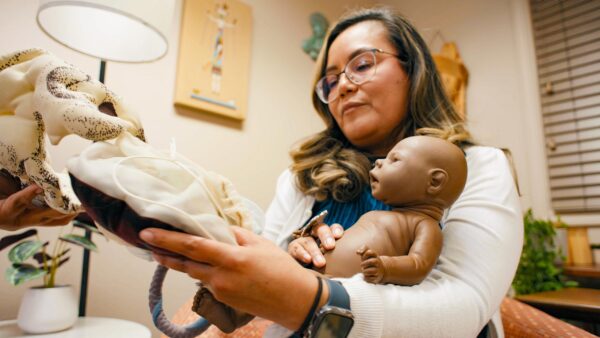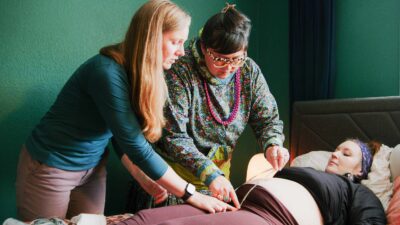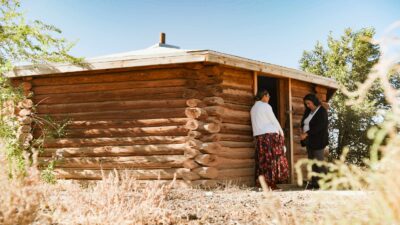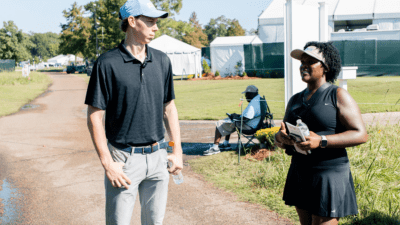This post is also available in: Español (Spanish) Kreyòl (Haitian Creole)
Strengthening the health and well-being of children often means supporting the health and well-being of the adults who care for them, including teachers.
Just ask Lindsey Fuller, executive director of The Teaching Well.
“Teaching is a stressful profession,” says Fuller. “Teachers are often expected to fill multiple roles while navigating complex dynamics with supervisors or colleagues, typically with few resources and little support or recognition.”
The Teaching Well’s Racial Healing Affinity Groups program – supported by the W.K. Kellogg Foundation (WKKF) – aims to meet that challenge. The Teaching Well is a national nonprofit wellness organization founded in Oakland, California, on Ohlone Tribal land, serving schools and nonprofits nationwide. They are committed to replenishing educators mentally, emotionally and physically so that they can continue to serve their communities.
Fuller, an educator and former administrator, says that many of these challenges emerged long before her days as a classroom teacher nearly a decade ago. But the COVID-19 pandemic made everything worse, intensifying the strain, as teachers struggled to support their students and families and deal with online and hybrid classrooms.
Responding to national racial trauma
Then, on May 25, 2020, George Floyd, a 46-year-old Black man, was murdered by police in Minneapolis, Minn. Feelings of shock, grief and anger erupted across the nation. Many people felt traumatized – by the event itself and its aftermath, as Floyd’s murder took its place among a string of highly publicized acts of racially motivated violence against Black Americans.
The Teaching Well team asked themselves what they could do to help. “We knew that one of our gifts is that we can hold space for healing,” Fuller says.
Accordingly, they designed a series of healing groups for K-12 educators to process the dynamics surrounding Floyd’s murder through a race-specific lens. In June 2020, The Teaching Well launched the national series online, hosting racial healing affinity groups for Black, Asian American/Pacific Islander, LatinX, White and multiracial educators, drawing 125 participants from across the United States and Canada.
Participants responded with enthusiasm. They wanted more.
With WKKF support, The Teaching Well set out to create a transformative racial healing program for educators to participate in throughout the school year. The program included convening a multiracial Wisdom Council of experts across several fields for insights and guidance and recruiting, as well as comprehensively training multiracial facilitators to lead the affinity groups.
Nine affinity groups emerged in the 2021-2022 school year. Responding to a national wave of anti-Asian violence, The Teaching Well designated three Asian healing groups for Asian American/Pacific Islanders, for people from the Middle East/North Africa (MENA) and from South West Asia and North Africa (SWANA) in an effort to bring greater visibility to these communities. Word soon spread. The Haudenosaunee Tribe from New York State responded to the launch with great interest and requested their own group, so The Teaching Well created a second cross-Tribal group.
Learning to process racial trauma
According to Fuller, the groups were designed to support experiences that allowed participants to reprocess feelings of trauma in their bodies, minds and nervous systems. This could play out in many ways, depending on the group.
For example, Fuller facilitated a Black affinity group where participants read a scenario involving a teacher experiencing anti-Blackness on a school campus. They then worked as a group to process that experience, engaging in somatic practices and structured exploration of the impact of various scenario elements on their nervous system. How would they respond if something like that happened to them? How would they show up in support of that teacher?
“We made a choice as facilitators not to talk about personal stories in that session because we didn’t want to retraumatize folks by going through their experiences again,” Fuller noted. “So, we customized the activity for what we believed was going to be more healing-centered for our specific community.”
The program for the 2022-2023 school year culminated with a three-day, multiracial virtual convening that focused on relationship-building, experiencing joy and learning. The convening offered three types of sessions: some specific to each affinity group, some that brought all groups together, and some “cross-pollination” sessions that brought together two or three affinity groups to talk about a topic that could further heal those communities. For example, one all-group session focused on colorism, while a “cross-pollination” session of the SWANA/MENA and cross-Tribal groups focused on building solidarity around the indigenous land rights movement.
Program ‘exceeded my expectations tenfold’
A Black affinity group participant said the program “exceeded my expectations tenfold. Initially, I expected to passively participate and foster relationships, but I never expected the big breakthroughs that happened throughout the year. This entire experience has forced me to re-evaluate how I look at self-care, advocacy, dignity and liberation.”
“I never knew how much I would be challenged to grow,” one White affinity group participant observed. “This group answered so many questions in my heart that I didn’t even know were there.”
For the 2023-2024 school year, The Teaching Well is conducting six affinity groups for Asian American/Pacific Islander, South Asian, Black, cross-Tribal, Latinx and White educators. Funding from the Kellogg Foundation will support two additional years of programming.
Fuller said that racial healing can dramatically change how educators deal with stressful situations at work, including how they interact with students, parents, and each other. “Part of our racial healing is in the way we treat other people who share our racial affinity; how to stay grounded in the face of a racialized trigger; how to respond instead of reacting; and staying calm in a difficult conversation with a supervisor or a colleague or a parent who’s upset, especially across identity difference,” she said.
For example, when addressing a discipline issue, Fuller said: “I can respond and not react to a child, I’m less likely to send them out for a referral or less likely to raise my voice at them. I’m more likely to treat their behavior as a learning opportunity or to lean toward that colleague and say, ‘I think there’s a solution that can work for both of us.’”
It’s hard work, she acknowledges. “But we believe our work is contributing to keeping educators not just in the field but keeping them well in the field — and that’s in service of kids.”
Ultimately, Fuller said, racial healing leads to collective liberation. “We know the way toward healing, and it’s anchored in community. When we’re all well, then we can be free.”







Comments